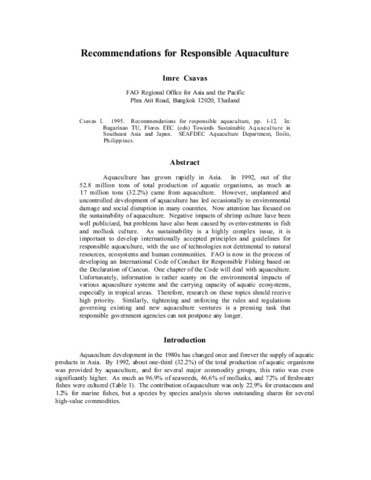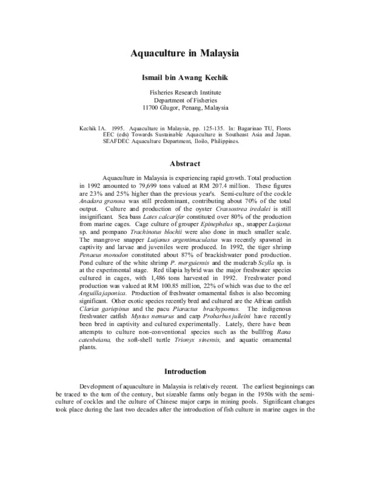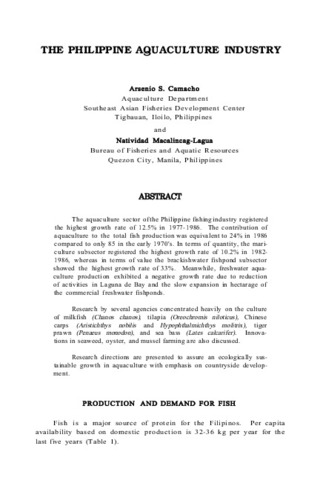Recommendations for responsible aquaculture
| dc.contributor.author | Csavas, I. | |
| dc.contributor.editor | Bagarinao, Teodora, U. | |
| dc.contributor.editor | Flores, Efren Ed C. | |
| dc.date.accessioned | 2011-06-03T09:23:12Z | |
| dc.date.available | 2011-06-03T09:23:12Z | |
| dc.date.issued | 1995 | |
| dc.identifier.citation | Csavas, I. (1995). Recommendations for responsible aquaculture. In T. U. Bagarinao & E. E. C. Flores (Eds.), Towards Sustainable Aquaculture in Southeast Asia and Japan: Proceedings of the Seminar-Workshop on Aquaculture Development in Southeast Asia, Iloilo City, Philippines, 26-28 July, 1994 (pp. 1-12). Tigbauan, Iloilo, Philippines: Aquaculture Department, Southeast Asian Fisheries Development Center. | en |
| dc.identifier.isbn | 971851127X | |
| dc.identifier.uri | http://hdl.handle.net/10862/111 | |
| dc.description.abstract | Aquaculture has grown rapidly in Asia. In 1992, out of the 52.8 million tons of total production of aquatic organisms, as much as 17 million tons (32.2%) came from aquaculture. However, unplanned and uncontrolled development of aquaculture has led occasionally to environmental damage and social disruption in many countries. Now attention has focused on the sustainability of aquaculture. Negative impacts of shrimp culture have been well publicized, but problems have also been caused by overinvestments in fish and mollusk culture. As sustainability is a highly complex issue, it is important to develop internationally accepted principles and guidelines for responsible aquaculture, with the use of technologies not detrimental to natural resources, ecosystems and human communities. FAO is now in the process of developing an International Code of Conduct for Responsible Fishing based on the Declaration of Cancun. One chapter of the Code will deal with aquaculture. Unfortunately, information is rather scanty on the environmental impacts of various aquaculture systems and the carrying capacity of aquatic ecosystems, especially in tropical areas. Therefore, research on these topics should receive high priority. Similarly, tightening and enforcing the rules and regulationsgoverning existing and new aquaculture ventures is a pressing task that responsible government agencies can not postpone any longer. | en |
| dc.language.iso | en | en |
| dc.publisher | Aquaculture Department, Southeast Asian Fisheries Development Center | en |
| dc.subject | Asia | en |
| dc.title | Recommendations for responsible aquaculture | en |
| dc.type | Conference paper | en |
| dc.citation.spage | 1 | |
| dc.citation.epage | 12 | |
| dc.citation.conferenceTitle | Towards sustainable aquaculture in Southeast Asia and Japan: Proceedings of the Seminar-Workshop on Aquaculture Development in Southeast Asia, Iloilo City, Philippines, 26-28 July, 1994 | en |
| dc.subject.asfa | fishery policies | en |
| dc.subject.asfa | aquaculture economics | en |
| dc.subject.asfa | shrimp culture | en |
| dc.subject.asfa | aquaculture development | en |
| dc.subject.asfa | aquaculture regulations | en |
| dc.subject.asfa | carrying capacity | en |
| dc.subject.asfa | environmental impact | en |
| dc.subject.asfa | mollusc culture | en |
| dc.subject.asfa | standards | en |
| dc.subject.asfa | aquaculture | en |
| dc.subject.asfa | sustainability | en |
| dc.subject.asfa | fish culture | en |
Files in this item
รายการนี้ปรากฏใน (s)
-
ADSEA '94 [21]
Proceedings of the Seminar-Workshop on Aquaculture Development in Southeast Asia, Iloilo City, Philippines, 26-28 July, 1994





